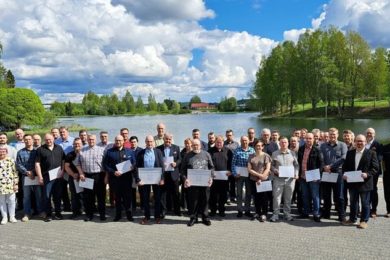A group of World Business Council for Sustainable Development (WBCSD) member companies is calling for public policies that make the best use of the forestry sector’s carbon profile and carbon cycle. The Sustainable Forest Products Industry (SFPI) working group proposes six key points that those responsible for devising forestry and carbon policies need to know, and it highlights the carbon opportunities and challenges facing the sector in its publication, The Sustainable Forest Products Industry, Carbon and Climate Change: Key messages for policy-makers.
Specifically, the SFPI calls on policy-makers to:
•Support public policies that promote accelerated depreciation rates so that companies can invest in energy- and carbon-intensity improvements
•Promote the efficient use of biomass through the value chain including recycling, extraction of energy and wise use of limited land resources
•Promote biomass energy as an important component of policies to control atmospheric CO2 based on adequate supplies of fresh fibre and increased recovery of used wood and fibre
•Create public policies and carbon crediting schemes that recognize all activities that accomplish real and verifiable reductions in atmospheric greenhouse gases
•Carefully evaluate public policies for unintended consequences, particularly those adverse to the goals of achieving reductions in atmospheric concentrations of carbon and supporting a sustainable forest products industry
•Expand efforts to bring more of the world’s forests under sustainable management as a means of reducing carbon emissions.
The SFPI recognizes that opportunities abound in the forestry sector to maximize the sector’s contribution to reducing greenhouse gas emissions, including breakthrough technologies to significantly reduce energy consumption within the industry. “Supplying society and industry with increasing amounts of sustainably produced wood and fibre for use as a raw material for products and for bioenergy, and increasing the capture and use of recycled fibre are two key opportunities,” said Mikael Hannus, Stora Enso’s Vice President of Energy and Co-Chair of the SFPI Energy and Climate Action Team. But with the opportunities also come challenges, such as managing the complex connections between the industry and the global carbon cycle, where hastily enacted climate change policies can have unintended consequences, and the fact that the industry is capital intensive, making it difficult and expensive to change technology in response to short-term policy measures. Additionally, rapidly growing interest in using wood and other types of biomass for fuels and bio-based products creates competition for the industry’s primary raw material and the land where it grows. “With some 540 Mt/y of CO2 being removed from the atmosphere and stored in forest products, the forestry sector plays an important role in addressing the carbon challenge. This role can be maintained and enhanced through appropriate policies,” said Reid Miner, Vice President at the National Council for Air and Stream Improvement, an independent, non-profit research institute that provided technical content for the publication. James Griffiths, WBCSD’s SFPI project director, notes that according to the UN’s Food and Agriculture Organization, around 20% of global CO2 emissions comes from forest conversion and degradation. “This means that bringing more of the world’s forests under sustainable management is a critically important mitigation strategy, and our working group urges all climate stakeholders – governments, development agencies, non-governmental organizations and the private sector – to support and implement appropriate policies that reduce deforestation in developing countries and encourage active reforestation,” he said. Meanwhile, Indonesia, host of a major climate change conference to be held in December, has called on rich countries to compensate poor states which preserve their rainforests to soak up greenhouse gases. “Countries that seek to enhance their carbon sinks — through forestation, afforestation, avoided deforestation — should be given incentive and rewarded fairly for doing so,” President Susilo Bambang Yudhoyono told the UN General Assembly. Speaking a day after a one-day high-level UN meeting on climate change, Yudhoyono said he was optimistic about a meeting scheduled in Bali, Indonesia, for December aimed at jump-starting talks to find a successor to the Kyoto Protocol, which seeks to curb climate-warming emissions. Indonesia has mobilized nations with most of the world’s tropical rainforests — Brazil, Cameroon, Congo, Costa Rica, Gabon, Malaysia and Papua New Guinea — ahead of the Bali talks to get rich countries to pay the world’s tropical nations not to chop down rainforests.






